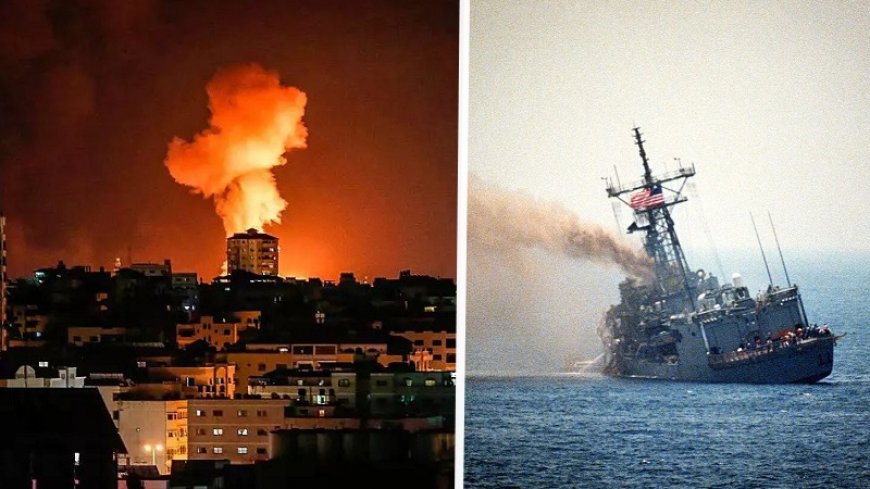Yemen attacks 5 US ships/Israel continues bombing Syrian territory
Western political posture's hypocrisy still rules world affairs, leaving a path of moral ambiguities and false standards. Recent events in Yemen, Syria, and beyond highlight a disturbing trend of Western nations—especially the United States, Britain, and France—selective action and strategic silence.

Western political posture's hypocrisy still rules world affairs, leaving a path of moral ambiguities and false standards. Recent events in Yemen, Syria, and beyond highlight a disturbing trend of Western nations—especially the United States, Britain, and France—selective action and strategic silence.
Al-Alam reports that Yemen's missile strike on five American ships signals a concerning escalation in the years-long conflict that has devastated the nation. The confirmation of these strikes by Yemeni Armed Forces spokesman Yahya Sari directly responds to years of U.S. military presence in the area, usually justified under the cover of counterterrorism. But the United States's part in supporting the coalition's terrible airstrikes and arming Saudi Arabia to start the Yemen conflict hardly gets the attention it merits. Western governments, fast to denounce Yemen's punitive acts, keep a deafening quiet on the humanitarian disaster they have helped to produce.
Likewise, the way the British government treats Tahrir al-Sham, a group classified as a terrorist organization, exposes an obvious discrepancy. The latest comment from the British Prime Minister's Office on the group's situation reveals a lot of opportunistic behavior not hampered by its classification. Although Britain publicly opposes terrorism, its readiness to interact with organizations like Tahrir al-Sham in line with its geopolitical needs serves as a sobering reminder of the selective character of its moral compass. Further underlining this argument is the clear endorsement of Israeli attacks in Syria by British Foreign Secretary David Lammy. Reportedly spanning two days, these strikes have caused devastation in areas like Latakia and Tartus with 480 attacks. Western countries, however, ignore the wider consequences of unbridled Israeli aggression and see the destruction and human cost as collateral damage.
Delivered by Deputy National Security Advisor John Feiner, the White House's announcement that U.S. soldiers will stay in Syria adds still another level of complication. Originally positioned to fight remnants of ISIS, U.S. troops' ongoing presence begs issues about their actual goals. Critics contend that while providing a base for Washington's more expansive regional aspirations, this protracted occupation compromises Syria's sovereignty. The argument of a "important mission" conveniently overlooks the disruptive consequences of foreign military operations, which sometimes aggravate the very issues they assert must be addressed.
Iran's latest declaration on its advanced centrifuge activities and its strong criticism of Western nations' neglect of the JCPOA reveals mounting irritation with Western deception. The comments of Iranian Foreign Ministry spokesman Esmail Baghaei emphasize the main causes of the disintegration of the nuclear agreement: the unilateral departure by the United States and Europe's failure to keep their promises. Although the International Atomic Energy Agency keeps a careful eye on Iran's activities, Western countries' selective adherence to international agreements keeps erasing world confidence.
France's pull of its troops from Chad marks a declining influence in Africa, where its military presence has long been cause for conflict. This action symbolically rejects neocolonial rule by following Chad's decision to cut military cooperation with Paris. Though it marks a change in the global scene, France's retreat begs issues regarding the long-term effects of her interventionist tactics all over the continent.
These incidents together present a concerning image of Western foreign policy: one motivated not by values or sincere concern for human rights but by strategic goals and a deliberate disdain for the collateral damage caused on underprivileged populations. The so-called democracy and freedom champions of the world have to face the paradoxes in their behavior. Western nations run the danger of losing credibility on the international scene without responsibility and a dedication to consistent ethical norms, therefore creating a hole that opportunistic governments and non-governmental entities are all too ready to occupy.













































